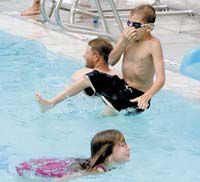| Youngsters enjoy a recent summer recreational outing at a local swimming pool. After confirming a case of cryptosporidium in Carbon County, the Southeastern Utah Health District encourages residents to exercise caution to prevent an outbreak of the abdominal parasite from occurring in the Castle Valley region. |
Local public health officials have confirmed a case of cryptosporidium in Carbon County.”We have a confirmed case and we are asking public swimming pool managers to take aggressive action to help stop the ongoing outbreak of cryptosporidium infection,” said David Cunningham, Southeastern Utah Health District representative.
According to an Aug. 31 press release, the health department has asked pool managers to restrict children younger than 5 years of age from swimming until the outbreak has subsided.
Additional recommended actions include weekly hyper-chlorination of pools, maintaining a minimum level of chlorination at all times and posting informational materials at all swimming facilities.
“Over the past month, many counties have seen dramatic increases in cryptosporidium, a parasite that causes long lasting, often debilitating diarrhea. In a normal year, Utah generally sees about 30 cases throughout the state. This year, the state has confirmed over 600 cases and the numbers keep climbing,” explained the press release.
The United States Centers for Disease Control reports that cryptosporidium is a protozoan parasite affecting the gastrointestinal tract of humans and animals. The parasite is shed in the feces in the form of an “oocyst,” which has a hard shell to protect it from the environment.
Infections may be asymptomatic or may cause watery diarrhea and abdominal cramps. The organism is transmitted by the fecal-oral route. Outbreaks have most commonly been associated with person to person and waterborne modes.
There are no specific drug treatment therapies for cryptosporidium outbreaks.
But according to the CDC, the immunocompetent person will usually recover from the illness within two weeks. Immunocompromised individuals may be unable to clear the parasite and suffer chronic and debilitating illness.
The CDC indicates that the first U.S. outbreak of cryptosporidium associated with recreational water exposure took place in Los Angeles County, Calif.
During the California outbreak, 44 individuals or 73 percent of the total number of persons from five separate swimming groups reported diarrhea after using the same pool in July and August. A fecal accident was noted the week before the onset of the illness.
Local health officials are cautioning the public to refrain from taking anyone wearing diapers to swimming pools. Child care centers are also being asked to avoid recreational water activities and will be instructed in how to prevent child to child transmission of the parasite.
“The public must be a proactive partner in helping to stop this outbreak,” said David Sundwall, Utah Department of Health director. “If the cases of cryptosporidium don’t slow down within the next two weeks, we may be forced to consider additional restrictions, such as the closing of public pools.”
Cryptosporidium can infect anyone, but some groups are more likely to develop serious illness, according to the press release. The individuals in question include young children and pregnant women who may be more susceptible to the dehydration resulting from diarrhea and people with weakened immune systems. Examples of weakened immune systems include people with HIV/AIDS, cancer and transplant patients who are taking certain immunosuppressive drugs or individuals who inherited diseases that affect the immune system.
Cunningham indicates that several recommendation along with good hand washing are the best way to avoid waterborne illnesses during a normal swimming season. Local residents should:
•Not swim while experiencing diarrhea and for two weeks after the disease has cleared.
•Never swallow the pool water.
•Take a shower before swimming and wash hands after using the restroom or changing diapers.
•Take the kids on bathroom breaks and check diapers often.
•Change diapers in a bathroom and not at poolside.
•Wash children thoroughly with soap and water before swimming.
For more information about cryptosporidium, Carbon County residents may contact the health district in Price at 637-3671.

